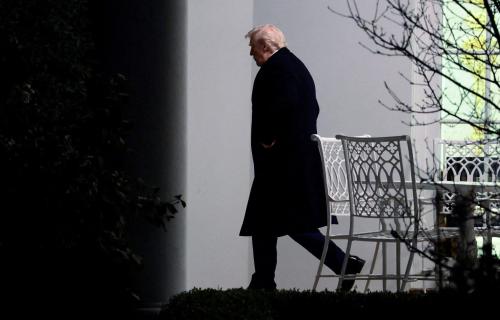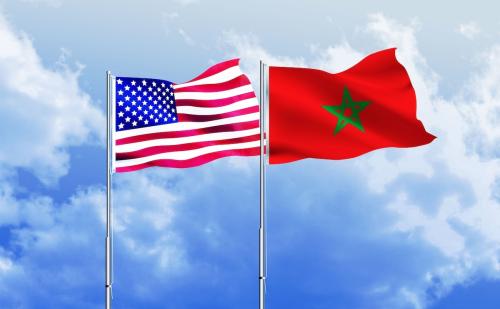The animating idea behind the United Kingdom leaving the European Union (EU) has been based on the premise that the U.K. will be better off, that it will have more freedom to act when not constrained by its membership in the EU. This is a myth that at its heart failed to understand the nature of sovereignty in a globalized world.
How sovereignty is exercised today can best be illustrated by the Greek myth of Odysseus, who bound himself to the mast of his ship in order to listen to the Sirens’ song without leaping to his death in the rocky sea. Odysseus accepted some constraints on his freedom in order to experience what was otherwise not possible—the bewitching Sirens’ song. This story reveals how constraints provide opportunities that would not otherwise exist. For Britain, it meant giving up some sovereignty as part of its membership in the EU in order to achieve more for its citizens than will be the case acting alone.
Unfortunately for Britain, the decision to leave the EU has now been made but the costs of this decision will play out for years to come. Sadly, younger voters who overwhelmingly voted in favor of remaining within the EU will bear the brunt of the costs to leave. The following are some specific ways these costs will manifest.
The economic impacts of Brexit
The most significant economic impact in the immediate term is heightened uncertainty. How will the U.K. relate to the EU market which is a destination for 50 percent of its exports and the largest source of investment? How do you invest in the U.K. when you don’t know the terms under which your goods and services will enter the EU, whether EU regulation will apply, or whether you can source the workers you need? This will result in less investment and lower economic growth.
The process of separating from the EU will be complicated and could take years, consuming a lot of the British government’s energy and focus. The longer this situation persists, the more the uncertainty and its negative economic effects.
The decision of the EU’s second largest economy to leave has also injected uncertainty into a fragile EU. Should the EU economy deteriorate, this will compound the negative economic impacts for the U.K.
Stock markets globally also fell on the news of Brexit, as financial markets anticipate global economic shocks.
The U.K. will also need to decide how it wants to access the EU market going forward. There are various options, including a limited trade arrangement like Turkey has with the EU, a series of bilateral trade agreements like Switzerland, or full integration a la Norway. Putting aside the details of each approach, the U.K. will face this stark choice—whether to remain fully economically integrated with the EU in which case the UK will need to accept free movement of people and EU regulation—but now without any say in how this regulation is made. Or be prepared to accept the economic costs of more limited integration with the EU in order to have more say over EU immigration.
The U.K. will also need to negotiate its participation in other international organizations where it had previously been represented by the EU. From a trade perspective, this will include membership in the World Trade Organization (WTO). While the U.K. will likely wish to participate in the WTO under the current terms granted to the EU, it will in effect need to negotiate new market access arrangements with all WTO members. As we have seen with the WTO accession of China in 2001 and more recently Russia in 2011, new WTO members are expected to grant significant new market access and there seems no reason why WTO members won’t demand something similar from the U.K. This could also take time, possibly years, during which the terms under which the U.K. can trade with the rest of the world will be uncertain at best.
The EU also has 12 free trade agreements and another 20 stabilization and association agreements with other countries in Europe and around the Mediterranean. The U.K. will now need to negotiate its own agreements with each of these countries. The U.K. will also no longer be part of the U.S.-EU Transatlantic Trade and Investment Partnership Agreement.
As a single country, the U.K. will now bring to the table access to a $2.9 trillion economy instead of the much larger range of benefits that it could offer when acting as a member of the $18.5 trillion EU economy. This simple fact will mean that in the trade negotiations to come, other countries will offer the U.K. less than when it had acted as part of the EU.
The political implications
While the referendum is over, the political fallout has only started. Prime Minister David Cameron will resign. Scotland, which voted in favor of remaining within the EU and wishes to remain an EU member, is now likely to seek a second referendum on independence from the U.K. In 2014 the Scotts narrowly voted in favor of remaining part of Great Britain.
On the continent, head of the far-right National Front Marine Le Pen has called for France to hold its own referendum on whether to leave the EU, and other right wing parties in Europe have voiced similar views. Russian President Vladimir Putin has also welcomed the outcome.
The political reactions to Brexit raise the prospect of a slow but eventual unravelling of the entire EU project. While still an unlikely outcome, it is not the long tail event it was before Brexit. There is now a real danger that the EU project, founded after the destruction of WWII with the aim of binding Europe together so tightly as to make further war unthinkable, has reached its peak and may begin to unwind. Not only would this compound the economic costs outlined above, but most importantly could create space for the politics of nationalism and xenophobia that the world hoped Europe had finally buried.
Maybe the appropriate Greek myth for Brexit is that of Sisyphus – where the King of Corinth was confined to pushing a large rock up a mountain only for it to roll down and to repeat this task indefinitely. Brexit could signal the unlearning of history and its inglorious repeat.
The Brookings Institution is committed to quality, independence, and impact.
We are supported by a diverse array of funders. In line with our values and policies, each Brookings publication represents the sole views of its author(s).



Commentary
Brexit: Less freedom, economic costs, meaner politics
June 24, 2016